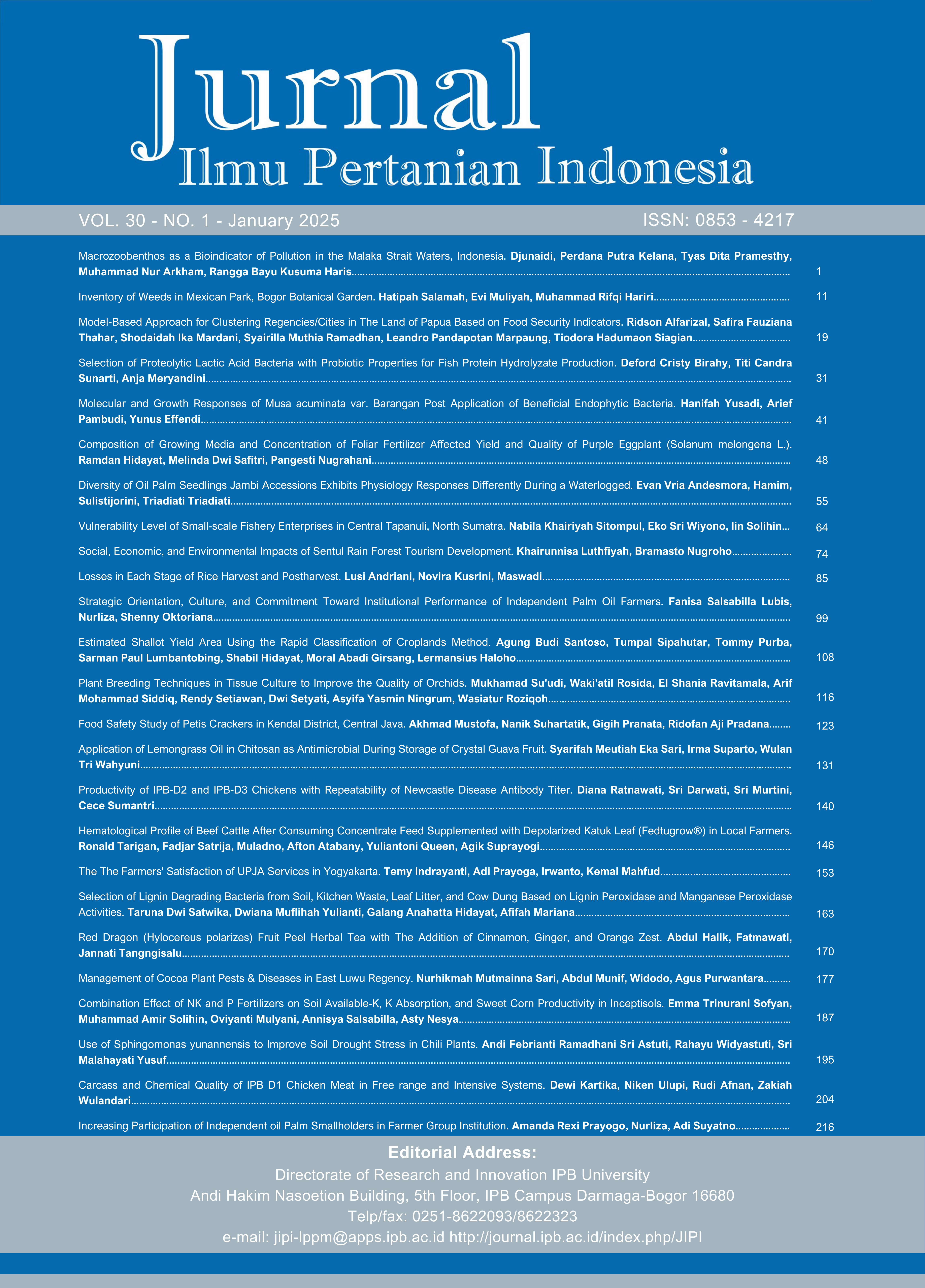Losses in Each Stage of Rice Harvest and Postharvest
Abstract
Indonesia ranks second in the world for high food loss and waste levels, totaling 300 kg per capita per year. Most of these losses occur during harvesting and post-harvest stages before the produce reaches the consumer. This research aimed to determine the correlation between these stages and production loss. The research was conducted using a descriptive quantitative method in Sungai Besar Village, Ketapang Regency, from November 2022 to February 2023. The respondents in this study were 89 farmers in the village. The results showed that each stage, including the harvesting and post-harvest stages, was correlated to yield loss. The yield loss at each stage varied greatly and is affected by several factors, including harvest age, harvesting methods, tools, rice varieties, threshing mechanisms, threshing delays, drying duration, drying medium size, grain cleaning, raw grain materials, maturity level, and milling machines. The percentage of yield loss ranges from 2 to 4.46% (in the harvesting and threshing stages), 0.52 to 1.55% (in the drying stage), and 1 to 2,5% (in the milling stage).
Keywords: rice, food loss, harvester, post-harvest
Downloads
References
Alam MA, Hossen A, Islam AS, Alam M. 2018. Performance evaluation of power-operated reapers for harvesting rice at farmers’ field. J. Bangladesh Agric. Univ. 16: 144–150. https://doi.org/10.3329/jbau.v16i1.36495
Alizadeh MR, Bagheri I. 2009. Field performance evaluation of different rice threshing methods. International Journal of Natural and Engineering Sciences. 3(3): 155.
Amusat MA, Eneh CK, Obiakor SC. 2016. Assessment of postharvest losses of rice at different stages of operation. CRDEEP Journals International Journal of Life Sciences. 5(1): xxx-xxx. www.crdeep.com/ijls
Ananto. 2002. Panduan Teknis Pengembangan Alat-alat Mesin Pertanian Mendukung Usaha Tani Padi. Jakarta (ID): Badan Penelitian dan Pengembangan Pertanian.
Arsyad M, Maryam S. 2020. Evaluasi tingkat kualitas dan mutu beras hasil penggilingan padi di Kecamatan Duhiadaa Kabupaten Pohuwato. Jurnal Pertanian Berkelanjutan. 8(1): 8–18.
Astanto, Ananto EE. 1999. Optimalisasi sistem penanganan panen padi di lahan pasang surut Sumatera Selatan. Buletin Enjiniring Pertanian. 6(1/2): 1–11.
Badawi AT. 2001. A proposal on the assessment of rice post-harvest losses. Cahiers Options Méditerranéennes, 58.
Bala BK, Haque MA, Hossain MA, Majumdar S. 2010. Post harvest loss and technical efficiency of rice, wheat and maize production system: Assessment and measures for strengthening food security. Bangladesh (IN): Bangladesh Agricultural University.
Bappenas. 2021. Ringkasan bagi Pembuat Kebijakan Food Loss & Waste di Indonesia.
Basappa G, Deshmanya JB, Patil BL. 2007. Post-harvest losses of maize crop in Karnataka Economic Analysis. Journal of Agricultural Sciences. 20(1): 69–71.
Basavaraja H, Mahajanashetti SB, Udagatti NC. 2007. Give to AgEcon search economic analysis of post-harvest losses in food grains in India: A Case Study of Karnataka. Agricultural Economics Research Review. 20: 117–126.
Begum EA, Hossain MI. 2012. Evaggelos papanagiotou economic analysis of post-harvest losses in food grains for strengthening food security in northern regions of Bangladesh. Int. J. Appl. Res. Bus. Adm. Econ. 1: 56–65.
Boxall RA, Gra J La, Martinez E, Martinez J. 1981. Post harvest losses of rice in The Dominican Republic. Trop. Stored Prod. Inf. 45: 5–10.
Budiharti U, Harsono, Juliana R. 2006. Perbaikan konfigurasi mesin pada penggilingan padi kecil untuk meningkatkan rendemen giling padi. http://Mekanisasi. Litbang.Deptan.Go.Id. [25 Jun 2011].
Daulay SB. 2005. Pengeringan Padi (Metode dan Peralatan). Medang (ID): E-USU Repository.
David J. 2018. Yield losses of Vub In 30 in various land of agroecosystem in West Kalimantan. Jurnal Pertanian Agros. 20(1): xxx.
David J. 2019. Susut hasil berbagai varietas unggul padi di sentra produksi padi di Kalimantan Barat. Jurnal Pertanian Agros, 21(1). Sama dengn di atas?
FAO. 2011. Global Food Losses and Food Waste – Extent, Causes, and Prevention.
FAO. 2018. Food loss analysis: Causes and solutions—Case study on the rice value chain in the Democratic Republic of Timor-Leste.
Gao L, Xu S, Li Z, Cheng S, Yu W, Zhang Y, Li D, Yu W, Wu C. 2016. Main grain crop postharvest losses and its reducing potential in China. Trans. Chin. Soc. Agric. Eng. 32: 1–11.
Greeley M. 1982. Farm‐level post‐harvest food losses: The myth of the soft third option. The IDS Bulletin. 13(3): 51–60. https://doi.org/10.1111/j.1759-5436.1982.mp13003007.x
Grolleaud M. 2002. Post-harvest losses: discovering the full story overview of the phenomenon of losses during the post-harvest system. Rome: FAO.
Gummert M, Nguyen-Van-Hung, Cabardo C, Quilloy R, Aung YL, Thant AM, Kyaw MA, Labios R, Htwe NM, Singleton GR. 2020. Assessment of post-harvest losses and carbon footprint in intensive lowland rice production in Myanmar. Scientific Reports. 10(1): xxx. https://doi.org/10.1038/s41598-020-76639-5
Hasan MK, Ali MR, Saha CK, Alam MM, Haque ME. 2019. Combine harvester: impact on paddy production in Bangladesh. Journal of the Bangladesh Agricultural University. 17(4): 583–591. https://doi.org/10.3329/jbau.v17i4.44629
Hasbullah R, Dewi AR. 2009. Kajian pengaruh konfigurasi mesin penggilingan terhadap rendemen dan susut giling beberapa varietas padi. Jurnal Keteknikan Pertanian. 23(2): 119–124. https://doi.org/10.19028/jtep.23.2.119-124
Herawati H. 2008. Mekanisme dan kinerja pada sistem perontokan padi. Jurnal Litbang Provinsi Jawa Tengah. 6(2): xxx.
Hidayat SI, Parsudi S, Putri GLAM. 2021. Telaah kehilangan hasil saat panen di Kabupaten Jombang. Mimbar Agribisnis: Jurnal Pemikiran Masyarakat Ilmiah Berwawasan Agribisnis. 7(1): 577–593.
HLPE. 2014. Food Losses and Waste in the Context of Sustainable Food Systems. High Level Panel of Expert.
Hodges RJ, Buzby JC, Bennet B. 2011. Postharvest losses and waste in developed and less developed countries: opportunities to improve resource use. The Journal of Agricultural Science. 149(S1): 37–45. https://doi.org/10.1017/S0021859610000936
Huang D, Yao L, Wu L, Zhu X. 2018. Measuring rice loss during harvest in china: based on experiment and survey in five provinces. J. Nat. Resour. 33(8): 1427–1438. https://doi.org/10.31497/zrzyxb.20170810
Indrasari SD, Rakhmi AT, Subekti A, Kristamtini K. 2016. Mutu fisik, mutu giling dan mutu fungsional beras varietas lokal Kalimantan Barat. Jurnal Penelitian Pertanian Tanaman Pangan. 35(1): 19–28. https://doi.org/10.21082/jpptp.v35n1.2016.p19-28
Iswari K. 2012. Kesiapan teknologi panen dan pascapanen padi dalam menekan kehilangan hasil dan meningkatkan mutu beras. Jurnal Litbang Pertanian. 31(2): xxx.
Jha SN, Vishwakarma RK, Ahmad T, Rai A, Dixit AK. 2015. Assessment of quantitative harvest and post-harvest losses of major crops/commodities in India. Punjab, India: Ministry of Food Processing Industries (Govt. of India), ICAR-Central Institute of Post-Harvest Engineering and Technology (ICAR-CIPHET).
Kader A. 2011. Postharvest Technology of Horticultural Crops. University of California Agriculture National Resource.
Ketut D, Swastika S. 2012. Harvest and post-harvest technologies: Adoption constraints and development strategy. Analisis Kebijakan Pertanian. 10(4): 331–346. https://doi.org/10.21082/akp.v10n4.2012.331-346
Kumar D, Kalita P. 2007. Reducing postharvest losses during storage of grain crops to strengthen food security in developing countries. Foods. 6(1): 1–22. https://doi.org/10.3390/foods6010008
Lesmayanti S, Sutrisno, Hasbullah R. 2013. Pengaruh waktu penundaan dan cara perontokan terhadap hasil dan mutu gabah padi lokal varietas Karang Dukuh di Kalimantan Selatan. Jurnal Pengkajian dan Pengembangan Teknologi Pertanian. 16(3): 159–169.
Li Z, Xia P, Wang Z, Wan S, He Y. 1991. Analysis of the constitution of grain postproduction losses and the preventive measures. J. Zhejiang Univ. Agric. Life Sci. 17: 389–395.
Lipinski B, Hanson C, James L, Kitinoja L, Waite R, Searchinge T. 2013. Installment 2 of “Creating a Sustainable Food Future” Reducing Food Loss and Waste. Washington DC: World Resources Institute. http://www.Worldresourcesreport.Org.
Molenaar R. 2020. Panen dan pascapanen padi, jagung dan kedelai. Eugenia. 26(1): 17–28.
Nath B, Hossen M, Islam A, Huda M, Paul S, Rahman M. 2016. Postharvest loss assessment of rice at selected areas of Gazipur District. Bangladesh Rice Journal. 20(1): 23–32. https://doi.org/10.3329/brj.v20i1.30626
Nugraha S. 2012. Inovasi teknologi pascapanen untuk mengurangi susut hasil dan mempertahankan mutu gabah/beras di tingkat petani. Buletin Teknologi Pascananen Pertanian. 8(1): 48–61.
Nugraha S, Setyono A, Thahir R. 1994. Studi optimisasi sistem pemanenan padi untuk menekan kehilangan hasil. Reflektor. 7(1−2): 4–10.
Nugraha S, Thahir R. 2007. Keragaan kehilangan hasil pascapanen padi pada 3 agroekosistem. Buletin Teknologi Pacsapanen Pertanian. 3: 43–49.
Patiwiri AW. 2006. Teknologi Penggilingan Padi. Jakarta (ID): Gramedia Pustaka Utama.
Prasetyo T, Kamarudin MIK, Armansyah. 2008. Pengaruh waktu pengeringan dan tempering terhadap mutu beras pada pengeringan gabah lapisan tipis. Jurnal Ilmiah Semesta Teknika. 11(1): 29–37.
Qu X, Kojima D, Nishihara Y, Wu L, Ando M. 2021a. A study of rice harvest losses in China: Do mechanization and farming scale matter? Jpn. J. Agric. Econ. 23: 83–88. https://doi.org/10.18480/jjae.23.0_83
Qu X, Kojima D, Nishihara Y, Wu L, Ando M. 2021b. Can harvest outsourcing services reduce field harvest losses of rice in China? Journal of Integrative Agriculture. 20(5): 1396–1406. https://doi.org/10.1016/S2095-3119(20)63263-4
Qu X, Kojima D, Wu L, Ando M. 2021. The losses in the rice harvest process: A review. Sustainability. 13(17): xxx. MDPI. https://doi.org/10.3390/su13179627
Rachmat R, Lubis S, Nugraha S. 2002. Teknologi penanganan gabah basah dengan model pengeringan dan penyimpanan terpadu. Majalah Pangan Media Komunikasi dan Informasi. 11(39): 57–63.
Sarjono AI, Pamungkas HD, Widata. 2018. Analisis mutu beras a (Oryza sativa L.) varietas Situ Bagendit pada perlakuan pengeringan dan frekuensi penggilingan yang berbeda. Jurnal Ilmiah Agroust. 2(2): xxx.
Sarkar D, Datta V, Chattopadhyay KS. 2013. Assessment of pre and post-harvest losses in rice and wheat in West Bengal. Santiniketan(IN): Agro-Economic Research Centre, Visva-Bharati
Sary SF, Abidin Z, Nugraha A. 2018. Analisis biaya penyusutan pada proses pengeringan pascapanen padi di Kecamatan Trimurjo Kabupaten Lampung Tengah. Jurnal Ilmu Ilmu Agribisnis. 6(3): 263–270. https://doi.org/10.23960/jiia.v6i3.263-270
Sattar M, Ali M, Ali L, Waqar QM, Ali AM, Khalid L. 2015. Grain losses of wheat as affected by different harvesting and threshing techniques. International Journal of Research in Agriculture and Forestry. 2(6): 20–26.
Setyono A. 2009. Pebaikan Teknologi Pascapanen dalam Upaya Menekan Kehilangan Hasil Padi. Orasi Pengukuhan Profesor Riset, 26 November 2009. Badan Litbang Pertanian. Jakarta (ID).
Setyono A, Sutrisno, Nugraha S. 2001. Pengujian pemanenan padi sistem kelompok dengan memanfaatkan kelompok jasa pemanen dan jasa perontok. Penelitian Pertanian Tanaman Pangan. 2(2): 51–57.
Suprihatno B, Daradjat AA, Satoto SEB, Widiarta IN, Setyono A, Indrasari SD, Lesmana OS, Sembiring H. 2009. Deskripsi Varietas Padi. Subang: Badan Penelitian dan Pengembangan Pertanian, Balai Besar Penelitian Tanaman Padi. Jakarta (ID).
Thahir R, Wijaya H, Setiawati J. 2000. Pemolesan beras melalui sistem pengkabut air. Prosiding Seminar Nasional Teknik Pertanian. Modernisasi Pertanian untuk Meningkatkan Efisiensi dan Produktivitas Menuju Pertanian Berkelanjutan, Bogor, 11−12 Juli 2000. Perhimpunan Teknik Pertanian Indonesia, 2, 246–326. Bogor (ID).
Tjahjohutomo R, Handaka H, Widodo TW. 2004. Pengaruh konfigurasi mesin penggilingan padi rakyat terhadap rendemen dan mutu beras giling. Jurnal Enjiniring Pertanian. II(1): 1–23.
Umar, Alihamsyah T. 2014. Pembersihan dan pengeringan padi. Mekanisme Pertanian. Vol(issue): xxx(pp. 107–118).
Umar S. 2011. Pengaruh sistem penggilingan padi terhadap kualitas giling di sentra produksi beras. Jurnal Teknologi Pertanian. 7(1): 9–17.
Veerangouda M, Sushilendra S, Prakash KV, Anantachar M. 2010. Performance evaluation of tractor operated combine harvester. Karnataka J. Agric. Sci. 23: 282–285.
Wiset L, Srzednicki G, Driscoll RH, Nimmuntavin C, Siwapornrak P. 2001. Effects of high temperature drying on rice quality. Agricultural Engineering International the CIGR Journal of Scientific Research and Development. 3: 1–10.

This work is licensed under a Creative Commons Attribution-NonCommercial 4.0 International License.
This journal is published under the terms of the Creative Commons Attribution-NonCommercial 4.0 International License. Authors who publish with this journal agree to the following terms: Authors retain copyright and grant the journal right of first publication with the work simultaneously licensed under a Creative Commons Attribution-NonCommercial 4.0 International License. Attribution — You must give appropriate credit, provide a link to the license, and indicate if changes were made. You may do so in any reasonable manner, but not in any way that suggests the licensor endorses you or your use. NonCommercial — You may not use the material for commercial purposes.























